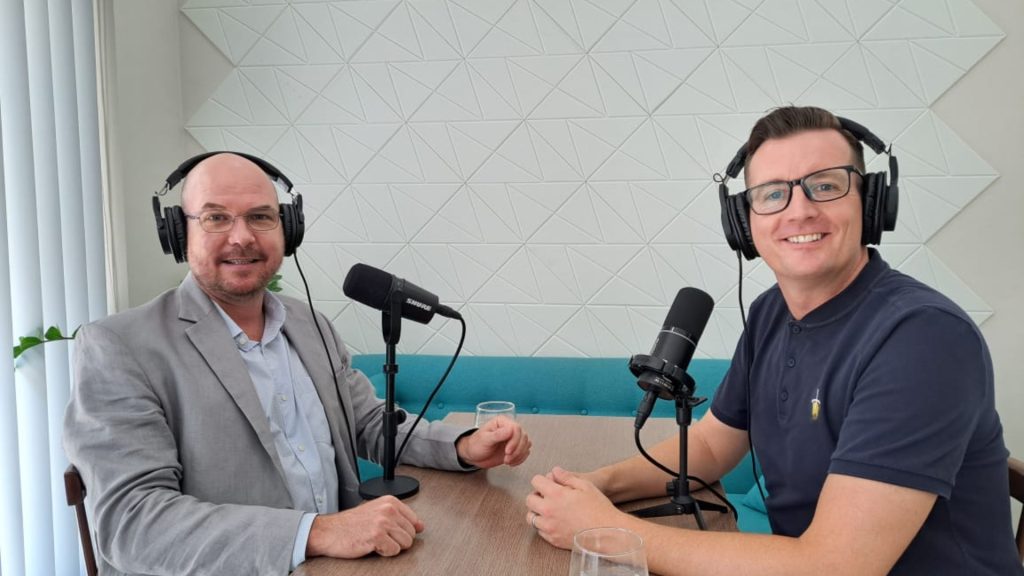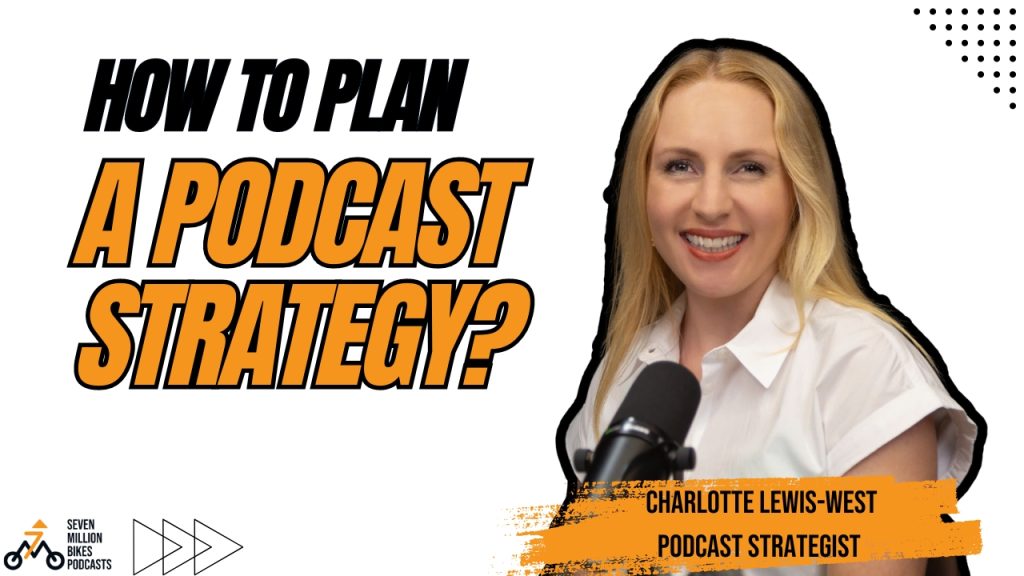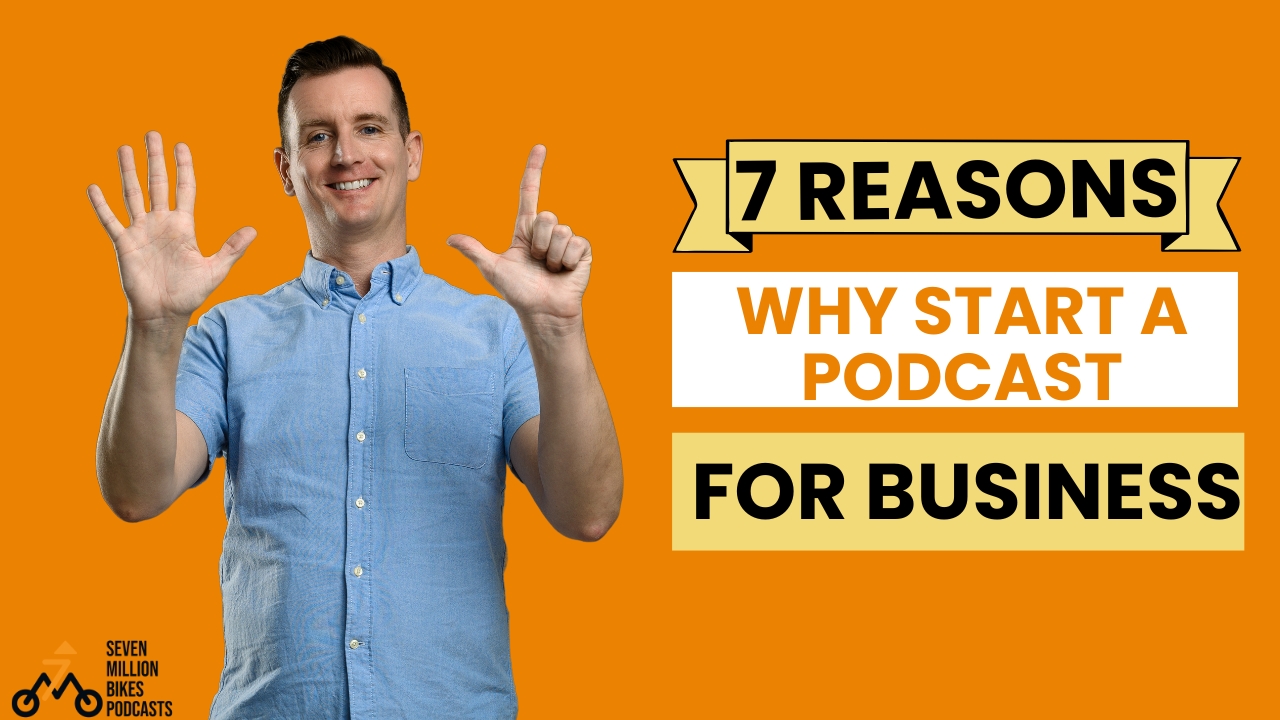7 Reasons To Start A Podcast: Why Podcasts Are Good for Your Business?
What if I told you there’s a marketing tool that’s cost-effective, engaging, and impactful? In this blog, I’ll reveal 7 reasons to start a podcast.
My name is Niall Mackay, founder of Seven Million Bikes Podcasts. I started making podcasts as a hobby in 2019, but now, my mission is to help people create impactful stories to inspire the world by offering podcasting services.
Whenever my friends or clients ask me about what channel they should build for their business, I always advise podcasts. Why podcasts? Because they offer a unique combination of depth, accessibility, and authenticity that other channels simply can’t match.
Table of Contents
What is a Podcast and Why Are They Rising in Popularity?
A podcast is a digital audio program that listeners can stream or download to their devices. Podcasts are often available on-demand, allowing users to choose what they want to listen to and when. Podcasts come in a variety of formats, from interviews and storytelling to educational content and roundtable discussions, catering to a wide array of interests.
In recent years, podcasts have seen a dramatic rise in popularity. This growth is fueled by the convenience and accessibility of the medium. With the ubiquity of smartphones and audio streaming platforms like Spotify, Apple Podcasts, and YouTube (Google Podcasts is dead now), it has never been easier for people to discover and listen to podcasts. According to What’s a Big Data statistics, up to 2024, there are over 5 million podcasts with 460+ million podcast listeners globally, a number that continues to grow year over year.

The rise of podcasts can also be attributed to their unique ability to fit seamlessly into busy lifestyles. People listen to podcasts while commuting, exercising, cooking, or even working. The audio format allows multitasking, making it a preferred choice for those seeking entertainment or education on the go.
Moreover, podcasts offer a sense of intimacy and connection. Hearing someone’s voice fosters a personal bond that written content or video often cannot replicate. This emotional resonance is a key reason businesses are increasingly leveraging podcasts as a powerful tool to engage their audience and build loyalty.
7 Reasons To Start A Podcast
1. Build Brand Authority
A podcast is an excellent way to establish your business as an authority in your industry. When your audience hears you discussing trends, solving problems, and sharing knowledge, they’ll associate your business with credibility and expertise.
Moreover, podcasts allow for deep dives into topics that written content might only skim. This long-form medium provides a unique opportunity to showcase your depth of knowledge. For example, a marketing agency could create a series breaking down complex digital strategies into actionable tips. Over time, this builds trust and loyalty among listeners.
While many businesses focus on traditional marketing, podcasts are still relatively untapped in many industries. By creating a well-produced show, you can stand out and gain a competitive edge.
- Share expert insights, industry trends, and actionable advice regularly.
- Create episodes that address common problems or questions in your field.
- Focus on delivering high-quality and well-researched content.
Remember, authority isn’t built overnight. It requires consistency and quality. Regularly publishing valuable episodes will ensure your business remains top-of-mind for your audience, paving the way for stronger brand recognition and customer loyalty.
2. Evergreen Content
One of the greatest advantages of podcasts is that they’re evergreen. Unlike social media posts or email campaigns with limited lifespans, podcast episodes remain relevant and accessible long after they’re published. This longevity makes podcasts a powerful tool for businesses aiming to create a lasting impact.
Whether someone discovers your podcast on the day it’s released or years later, the content remains valuable. This is particularly effective for businesses with complex products or services, as podcasts allow you to explain these in a timeless, engaging format.
To maximize the evergreen nature of your podcast, ensure episodes are well-optimized for search engines. Use clear, descriptive titles and include detailed show notes. This way, potential listeners searching for specific topics are more likely to find your content.
- Optimize episodes with clear titles and searchable keywords.
- Write detailed show notes to help listeners find key takeaways.
- Periodically reshare older episodes that continue to provide value.
Evergreen podcasts also free you from constantly creating new content to stay relevant. Instead, each episode becomes a long-term asset, generating leads and building brand awareness over months and even years.

3. Effective Marketing
Podcasts are less intrusive than ads or emails, offering value upfront without directly selling. They also create an emotional connection that banner ads or PPC campaigns cannot replicate. Listeners opt into podcasts, meaning the audience is already engaged and interested.
With minimal equipment and production costs, you can create a series of episodes that promote your brand, showcase your expertise, and connect with your target audience. Therefore, podcasting is a cost-effective solution.
Additionally, podcasts allow you to target niche audiences. By focusing on specific topics relevant to your industry, you’re more likely to attract listeners who are genuinely interested in your business. This targeted approach ensures that your marketing efforts reach the right people.
Pairing your podcast with other marketing channels enhances its impact. For example, you can repurpose episodes into blog posts, social media snippets, or email campaigns, creating a cohesive content strategy. This multiplies your reach and strengthens your brand’s presence across platforms. Here are some tips:
- Target niche audiences by focusing on specific industry topics.
- Promote your podcast across multiple channels (social media, email, etc.).
- Repurpose podcast content into blog posts, videos, or social media snippets.
- Include calls to action in episodes to drive engagement or sales.
4. Engage Customers on a Deeper Level
Through storytelling, podcasts can evoke emotions and make your brand’s message more memorable. For instance, a small business owner might share their entrepreneurial journey, inspiring listeners and building a loyal community.
The format of podcasts—whether conversational or monologue—encourages listeners to spend more time engaging with your content. This extended attention is rare in today’s fast-paced digital landscape and helps strengthen your relationship with your audience.
Ultimately, engaging customers on a deeper level fosters loyalty. Listeners who feel connected to your brand are more likely to become repeat customers and advocates for your business.
- Use storytelling to make your brand relatable and memorable.
- Address customer pain points and provide tailored solutions.
- Include personal anecdotes or behind-the-scenes insights.
- Engage with listeners through Q&A sessions or live episodes.

5. Podcast for Networking
Hosting a podcast opens doors for networking opportunities that can benefit your business. Inviting guests to a podcast is a natural and non-intrusive way to start conversations with industry leaders. It provides a structured format for collaboration, unlike cold emails or social media DMs, which might feel transactional or impersonal.
These collaborations often lead to mutual benefits. Guests are likely to share the podcast with their networks, exposing your brand to a wider audience. This cross-promotion amplifies your reach and builds credibility by association with respected individuals in your industry.
The networking benefits don’t stop with guests. Engaging with your listeners through Q&A episodes or feedback sessions also strengthens connections within your community. Over time, your podcast becomes a hub for valuable interactions and collaborations.
Remember to keep in touch, follow up, and promote collaboratively to maintain good relationships in the industry.

6. Humanize Your Brand
A great way to connect deeply with your customers is to humanize your brand. By using your voice and personal stories, you create an emotional connection with your audience that goes beyond traditional marketing. Listeners get to hear the people behind the business, making your brand more relatable and authentic. Whether it’s sharing behind-the-scenes moments, discussing your team’s values, or highlighting customer success stories, podcasts let you showcase the human side of your business.
- Share personal stories and behind-the-scenes glimpses of your business.
- Highlight your team’s values, culture, and milestones.
- Use an approachable tone to foster authenticity and relatability.
For example, I am offering podcasting services, so I create a podcast, “Smarter Podcasting” that shares tips and insights about podcasting. This way, the clients can imagine the person behind the brand, and who they are working with, and it contributes to establishing more connections and trust with my audience and clients.
7. Adapt to Busy Lifestyles
Podcasts fit seamlessly into the busy lives of modern consumers. Unlike other forms of content that demand full attention, podcasts can be enjoyed while multitasking—whether commuting, exercising, or doing household chores.
This convenience makes podcasts an ideal medium for reaching audiences who might not have time to read blogs or watch videos. By meeting your audience where they are, you ensure your message is heard without competing for their time and attention.
The rise of smartphones and smart speakers has further boosted podcast accessibility. With just a few taps, listeners can tune in to episodes anytime, anywhere. This on-demand nature makes it easy for businesses to stay connected with their audience.
Moreover, podcasts allow you to build a consistent presence in your listeners’ routines. A weekly or biweekly show becomes something your audience looks forward to, fostering loyalty and engagement.
Remember to:
- Create episodes that are easy to consume while multitasking.
- Keep episode lengths flexible to suit different listener preferences.
- Ensure your podcast is available on popular platforms like Spotify or Apple Podcasts.
Things to Consider When Starting a Podcast
After seeing these benefits and reasons to start a podcast, I know you want to start your own podcast now. Let me help you define some key elements when crafting a show:
Topic and Niche
The first thing to consider is your topic or niche. Your podcast should focus on an area where you have expertise or passion, but it also needs to resonate with a specific audience. Spend time researching your potential audience’s interests, challenges, and questions. This understanding will guide you in creating episodes that provide real value.
Plan your content
The strategy is as important as the content itself. Having a clear vision for your podcast format, tone, and style is crucial. Will your episodes feature interviews, solo monologues, or panel discussions? What kind of topics will you cover, and how will they tie into the overall theme of your show? Creating a content calendar can help you stay organized and ensure a consistent flow of episodes.

Podcast Equipment
Investing in quality equipment is another critical step. While you don’t need to break the bank, having a good microphone, headphones, and recording software can significantly improve the audio quality of your podcast. Poor audio quality can deter listeners, even if your content is excellent.
I recommend the podcast starter kit, suitable for beginners.
Editing and Post-production
Finally, think about the editing process. Editing is where your raw recordings are polished into a professional final product. You’ll need software for editing, such as Audacity or Adobe Audition, and the ability to cut out mistakes, add music or sound effects, and balance audio levels.
If editing feels overwhelming, you might consider outsourcing this step to a professional. Remember, a well-edited podcast reflects your brand’s professionalism and helps keep listeners engaged. At Seven Million Bikes Podcasts, you can work directly with me, Niall Mackay, who has experience and deep knowledge about the podcast industry. Don’t hesitate to contact me if you need any help or advice about podcasts.
Starting a podcast requires thoughtful preparation, but by focusing on these key elements, you’ll be well on your way to creating a show that captures and retains your audience’s attention.
Conclusion
Podcasts are more than just a trend; they are a powerful tool for businesses looking to connect with their audience, build authority, and stand out in a crowded market.
If you’ve been considering launching a podcast for your business, there’s no better time to start.


